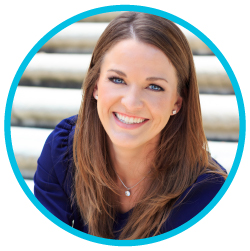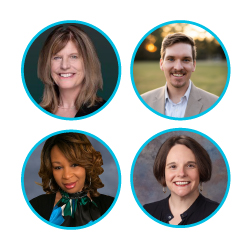STEM21 Featured Speakers & Panelists
This year’s STEM21 includes an all-star lineup of featured speakers from across the country. No matter what day you are registered, all keynote presentations are available to all STEM21 attendees.
Keynote Speakers
Monday, July 26 • 10:30–11:30 AM EDT
A Morning with Kate Biberdorf
Dr. Kate Biberdorf
Professor of Chemistry at The University of Texas at Austin
As seen on the Today Show and The Late Show with Stephen Colbert, Dr. Kate Biberdorf is breaking stereotypes and blowing stuff up—all in a good pair of heels. Through her theatrical and hands-on approach to teaching, Dr. Biberdorf is breaking down the image of the stereotypical scientist, while reaching students that might otherwise be intimidated by science. Drawing forth emotional responses, rather than rote recitation of facts is key to Biberdorf ’s dynamic approach to her program, as well as to science in general. Her exciting and engaging program leaves audiences with a positive, memorable impression of science—all while diminishing the stigma around women in science. Dr. Biberdorf is the author of Kate the Chemist: The Big Book of Experiments, a collection of 25 kid-friendly science experiments that come prepared with a messiness factor rating and a note from Kate about how each experiment works. Her newest book, Dragons vs. Unicorns, is a children's novel and was released in March 2020.

Monday, July 26 • 2:45–3:30 PM EDT
Tools @ Tea Time with Tim & Rob
Tim Blesse
Teacher Programs Consultant, Denver Museum of Nature & Science
Robert Payo
Director of K–12 Education, Denver Urban Gardens
Tim and Rob are back for tea and lively conversation as we look toward next year, once again reflecting on our use of technology in the classroom. We'll look at one of the big questions on all our minds: Now that we know what we know, how can we use that to support students in both their learning and their emotional well-being as we move back into the "new normal" classroom?

Tuesday, July 27 • 10:30–11:30 AM EDT
Building Resilience in Science Students
Jami Valentine Miller, PhD
Founder, African American Women in Physics, Inc.; and Primary Patent Examiner, U.S. Patent and Trademark Office
In this talk Jami will discuss strategies that can be used to build resilience, with a particular emphasis on increasing the percentage of women and underrepresented minorities that choose to pursue STEM studies. She will use examples from her experiences as one of the few African American women with a PhD in physics and discuss strategies to improve diversity, equity, and inclusion efforts in STEM.

Wednesday, July 28 • 10:30–11:30 AM EDT
From Students to STEM Teachers!
John Arthur
2021 Utah Teacher of the Year and a Top 4 Finalist for National Teacher of the Year
If a student in your class is amazing at math or a wiz in the science lab, what job do you tell them they'd be good at? I think the answer we need to tell them is, “You would be a great teacher!” Students should leave our classes loving STEM and wanting to TEACH STEM! In this conversation, we will explore ways teachers can pass on both our love for STEM and our passion for our profession to our students.

Thursday, July 29 • 10:30–11:30 AM EDT
Blankets Cover, Teachers Transform: Centering Justice in Science Curriculum
Daniel Morales-Doyle, PhD
Assistant Professor of Science Education, Department of Curriculum and Instruction, University of Illinois Chicago
As science educators, what contributions can the disciplines we teach make to ongoing struggles for social and environmental justice? This presentation explains how keeping this question at the center of our work provides opportunities for our students to engage with our disciplines in deeper, more critical, and potentially transformative ways.

Wednesday, July 28 • 2:45–3:30 PM EDT
Simulations in the Science Classroom
Moderator: Scott Buhr
Science Teacher, Hillcrest High School, Greenville, SC
Simulations have long been in the instructional tool box of the science educator. With the rise of online and hybrid offerings, simulations of the real world play an increasingly important role for science students all around the globe. You will not want to miss this keynote panel hosted by highly accomplished teachers with a wide variety of experiences. The guided discussion will focus on how simulations are implemented in the classroom to maximize their instructional impact and drive inquiry.

Friday, July 30 • 10:30–11:30 AM EDT
Student-led Panel on the Invisibility of Students with Disabilities in STEM Fields
Moderator: Janelle M. Johnson
Associate Professor of STEM Education and Noyce Principal Investigator, Metropolitan State University of Denver
The general absence of disability from the educational equity lens makes it hard to determine and address the degree of underrepresentation of people with disabilities in the STEM fields. How do we close a gap that’s largely invisible? Three Noyce Scholars from Metropolitan State University of Denver offer their perspectives on this issue, and invite feedback from session participants.









